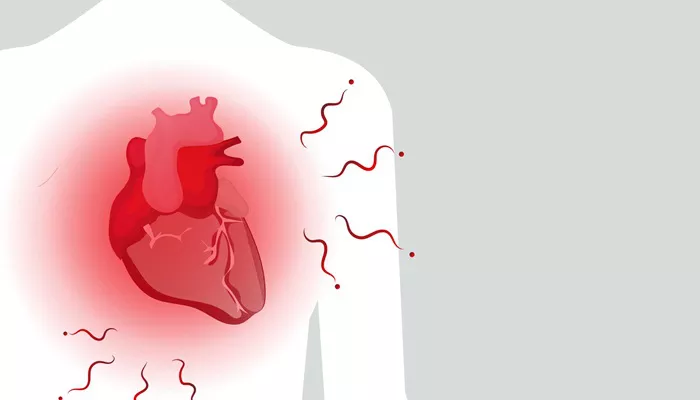As a cardiologist and cardiovascular specialist, I understand that a pounding heart can be unsettling. This sensation, often described as heart palpitations, is when you feel your heart beating hard, fast, or irregularly. While usually harmless, it can sometimes signal an underlying heart problem. This article provides a detailed overview of pounding heart symptoms, causes, and treatment options in simple terms.
What Is A Pounding Heart?
A pounding heart is a type of heart palpitation. It feels like your heart is beating very strongly, rapidly, or fluttering inside your chest or throat. Some people notice it as a flip-flopping or skipping beat. These sensations can occur during activity or at rest and may last a few seconds to minutes.
Causes of A Pounding Heart
Many factors can cause a pounding heart, often related to how the heart beats or how your body reacts to stress or stimuli.
Common causes include:
Emotional triggers: Stress, anxiety, panic attacks, and depression can increase heart rate and cause palpitations.
Physical activity: Strenuous exercise can make your heart beat harder and faster.
Stimulants: Caffeine, nicotine, certain cold medicines (like pseudoephedrine), cocaine, and amphetamines stimulate the heart.
Hormonal changes: Pregnancy, menstruation, and menopause can affect heart rhythm.
Fever or illness: Can increase heart rate and cause palpitations.
Thyroid problems: Both overactive and underactive thyroid can cause irregular heartbeats.
Heart conditions: Arrhythmias (irregular heart rhythms), cardiomyopathy, heart valve disease, or an enlarged heart (cardiomegaly) can cause pounding heart sensations.
Sometimes, the exact cause cannot be found, and the palpitations are benign.
Risk Factors
Certain factors increase the likelihood of experiencing a pounding heart:
- High stress or anxiety levels
- Pregnancy
- Use of stimulant medications or substances
- Thyroid disorders
- Existing heart disease or previous heart surgery
Symptoms of a Pounding Heart
Common symptoms include:
- Heart beating too fast or hard
- Fluttering or flip-flopping sensation in the chest
- Skipped or extra beats
- Feeling the heartbeat in the throat or neck
- Sometimes accompanied by dizziness, shortness of breath, or chest discomfort
If you experience pounding heart with chest pain, fainting, severe shortness of breath, or dizziness, seek emergency medical care immediately.
When Is A Pounding Heart Serious?
While most pounding heart episodes are harmless, they can sometimes indicate serious heart problems such as:
Arrhythmias: Fast (tachycardia) or slow (bradycardia) heart rhythms that disrupt normal heart function.
Atrial fibrillation: Irregular heartbeat that increases stroke risk.
Heart failure or cardiomegaly: Enlarged heart that pumps inefficiently.
Cardiac arrest: Rare but life-threatening when the heart stops beating effectively.
Seek urgent care if pounding heart comes with chest pain, fainting, severe dizziness, or breathlessness.
Diagnosis
To find the cause of a pounding heart, doctors may perform:
- Medical history and physical exam
- Electrocardiogram (EKG/ECG) to check heart rhythm
- Holter monitor or event recorder to capture heartbeats over time
- Echocardiogram to assess heart structure and function
- Blood tests for thyroid function and other conditions
- Stress tests or imaging if needed
Treatment of a Pounding Heart
Treatment depends on the underlying cause:
Lifestyle Changes
- Reduce caffeine, nicotine, and stimulant use
- Manage stress through relaxation techniques, yoga, or meditation
- Avoid excessive alcohol
- Maintain regular exercise and healthy diet
Medical Treatments
Medications: Beta-blockers to slow heart rate, anti-arrhythmic drugs to control rhythm, thyroid medications if needed.
Therapies for anxiety or depression: Cognitive behavioral therapy or antidepressants can reduce palpitations caused by emotional factors.
Procedures And Devices
Cardioversion: Electrical shock to restore normal rhythm in arrhythmias.
Catheter ablation: Destroys abnormal electrical pathways causing irregular heartbeats.
Pacemaker or implantable cardioverter-defibrillator (ICD): Devices implanted to regulate or correct dangerous heart rhythms.
Surgery: Rarely needed but may be used for structural heart problems or severe arrhythmias.
Prevention
To lower the risk of pounding heart episodes:
- Manage stress and anxiety
- Avoid stimulants and excessive alcohol
- Control underlying conditions like thyroid disease or high blood pressure
- Maintain a heart-healthy lifestyle with balanced diet and regular exercise
- Regular check-ups if you have a history of heart disease or palpitations
Conclusion
A pounding heart is a common symptom that can range from harmless to serious. Understanding the symptoms, causes, and treatment options helps in managing this condition effectively. If you experience frequent or severe pounding heart sensations, especially with other symptoms like chest pain or fainting, consult a healthcare professional promptly for evaluation and care.
Related topics:


